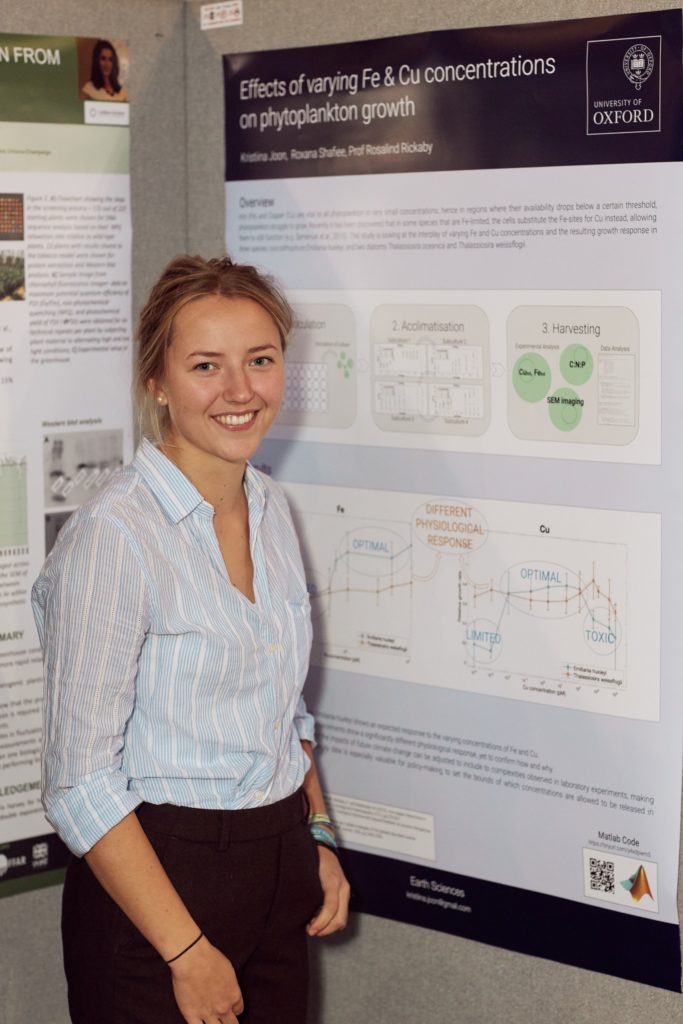When Kristiina Joon (23) was a student at the Tallinn Secondary School of Science, she took samples from the River Pirita over the course of one year. The goal was to investigate the “hydrophilic and hydrophobic characteristics of humin” and through that find out which pollutants are most harmful to the environment, when they end up in water. As is clear already from terms such as the “high-performance liquid chromatography method”, at least on the upper-secondary school level this was a hard hitter, so along with its author the work ended up at the International Science Youth Forum held in Singapore. It is no surprise that a year later, Joon graduated with honours – an achievement that required straight A’s across all subjects. “I have to admit that it wasn’t that hard to achieve,” Joon timidly says, “although some were subjects, where I wasn’t sure whether I would end up getting an A or a B, so I did have to make a bit more effort.”
Five years after receiving her secondary school diploma, Joon is back at the School of Science, this time as a young colleague for her former teachers (and a teacher to some of her former schoolmates as well). She teaches geography to grades seven through nine, natural science to grades five and six, and an elective course called “Life Chemistry” to the last year students. “This is a subject, where we look at the chemistry of biological processes, for example, how life started.” Joon spent the five years away from her school in Oxford, where the young woman from Estonia first received her Bachelor’s and then her Master’s degree.
“One of my acquaintances said that, sure, of course apply, because unless you do, you will never know whether you would have been accepted or not. And it’s a good thing this person told me that, because otherwise I wouldn’t have even tried,” recalls Joon, thinking back to her admissions to one of the best universities in the world.
In a sense, the university with a history dating back to the 11th century has a Harry Potter-like feel in Joon’s memory, both for its medieval buildings, as well as the rules governing academic life. For example, the tradition to always wear dark attire called “sub fusc” under a long black gown every Sunday and also when attending exams. “There is plenty of ceremony to it all, but academically speaking, Oxford really was very interesting. All the professors and lecturers were experts in their fields, which made the experience very exciting. At the same time, I must admit that I was surprised at how few international students there were in bachelor’s studies.” Joon admits that she only met two Estonians during her years at Oxford (“Cambridge seems to be more popular”), and in her Earth science course, she was the only student with an international background, which made blending in somewhat more complicated. Although in academic communication, Oxfordians speak the Queen’s English, the chats between students are peppered with British slang, whose finer points Joon wasn’t versed in at the beginning.
In her studies, Joon focused on modelling seismic waves in water, in order to study their spreading. “These waves are similar to sound waves. Although people do not hear them, whales, for example, do,” Joon describes the frequencies that human ears can’t catch. These can be caused by various phenomena, for example, the tides, human activity, but also huge glacial masses crumbling into the ocean. At the same time, the origin of all discovered waves is far from a completed task, and Joon admits that this is a field with a lot of perspective, for example, for better understanding the structure of the Earth’s crust or anthropogenic noise. As a practical output, this strengthening “white noise” can serve as a warning to polar researchers already now for potential glacial collapses.
In addition to her studies, at Oxford Joon found the time to serve as the vice president of the Worcester College rowing club and as the secretary of the Oxford ski and snowboard club, which joins over two hundred members. However, her main athletic discovery in England was rock climbing, which Joon still does “with great dedication.” Rock climbing can be practiced indoors in Estonia, for example, at Ronimisministeerium, but also on boulders, which there are plenty of in Estonia. Before the pandemic broke out, Joon managed to go climbing in the Dolomites and in Poland, as well as volunteer as an environmental activist to research the life of sea turtles at the Lagon Bleu in Mauritius. “Each sea turtle has a unique marking on their cheek, like humans have fingerprints, so these can be used to identify them very accurately,” Joon now knows, while admitting that as a consequence of global warming, most of the coral reef at the bottom of the lagoon has already died. “So it was a sad experience too.”
The coronavirus situation, which has nearly wiped out travel opportunities, is having a “fundamental” impact on Joon’s work as a teacher. “Let’s be honest, it is quite stressful to live in a time, when you never know what will happen the next day – which classes will be learning at home and which will not,” says the young teacher. “However, to tell you the truth, at the university I had a harder time adapting to corona, because at the School of Science I can at least be there for the students. I believe that this is a tough time for them too.”
At the same time, Joon believes that her career as a teacher is a temporary one, and the idea to move on to doctoral studies seems feasible “within a few years”.
Kali or coke? “Kali, for sure.”
Pine or fir? “Pine.”
City or country? “Country.”
Cat or dog? “Oh, that’s a tough one. Dog.”
East or west? “East.”
Left or right? “Right.”
Sour or sweet? “Sour.”
Red or white? “White.”
Sun or Moon? “Moon.“


